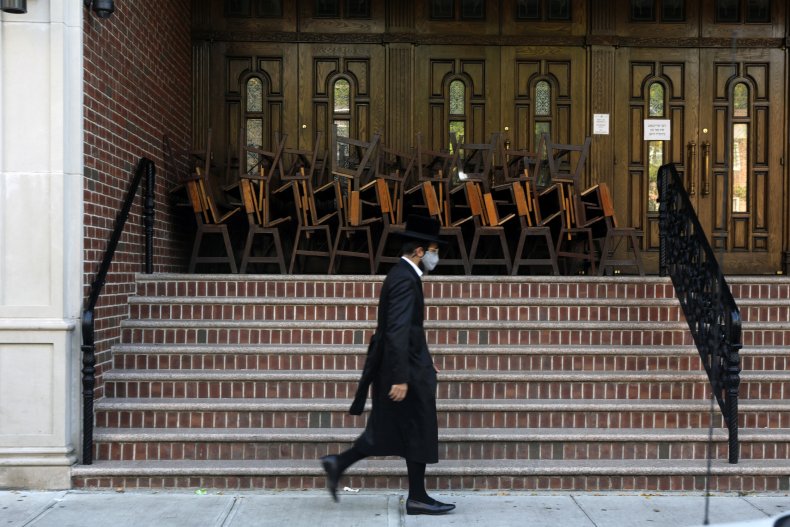Justice Amy Coney Barrett played a decisive role as the Supreme Court barred New York from enforcing certain coronavirus restrictions on religious services.
The Roman Catholic Church and Orthodox Jewish synagogues in the Brooklyn and Queens borough of New York City had sued to challenge attendance limits at houses of worship in areas that were harder hit by the virus.
Attendance was capped at 10 and 25 people for red and orange zones, respectively. However, the ruling won't have an immediate impact as the two groups are in areas now designated as yellow zones, where houses of worship can hold services at 50 percent of their maximum occupancy.
The Supreme Court voted 5 to 4 to bar the enforcement of the measures, with the court's newest member Barrett casting a deciding vote. Chief Justice John Roberts Jr. and the court's three liberal justices dissented.
The decision was at odds with rulings about capacity limits at churches in California and Nevada earlier this year.
In those cases, decided when Barrett's predecessor, the liberal Justice Ruth Bader Ginsburg, was on the court, the justices voted 5-4 to leave in place restrictions the governor imposed on religious services. Barrett, a conservative and devout Catholic, was confirmed to the court last month after Ginsburg's death in September.
The court's order addressed two applications—one from the Roman Catholic Diocese of Brooklyn, which covers Brooklyn and Queens, and another from Agudath Israel of America, two synagogues and two other individuals.
Both applications argued that houses of worship were being unfairly treated by New York Gov. Andrew Cuomo's executive order imposing new state restrictions last month.
The synagogues argued that governor's restrictions had singled out the Orthodox Jewish community. Cuomo "did not attack religious belief generally, but singled out a particular religion for blame and retribution for an uptick in a society-wide pandemic," it said.
New York said religious services were being treated more favorably than secular gatherings that carry a similar infection risk, such as concerts and theater performances, which were banned completely.
But in an unsigned order, the majority of the court agreed that Cuomo's restrictions had violated the First Amendment's protection of the free exercise of religion.
"Members of this Court are not public health experts, and we should respect the judgment of those with special expertise and responsibility in this area," it said. "But even in a pandemic, the Constitution cannot be put away and forgotten."
In a concurring opinion, Justice Neil Gorsuch said Cuomo had treated religious exercises far more harshly than secular activities.
"It is time—past time—to make plain that, while the pandemic poses many grave challenges, there is no world in which the Constitution tolerates color-coded executive edicts that reopen liquor stores and bike shops but shutter churches, synagogues, and mosques," he wrote.
In his dissent, Roberts said the measures "do seem unduly restrictive," but he added that it "is a significant matter to override determinations made by public health officials concerning what is necessary for public safety in the midst of a deadly pandemic."
In another dissent, Justice Sonia Sotomayor, joined by Justice Elena Kagan, said she fears the ruling will "only exacerbate the nation's suffering."
"Justices of this Court play a deadly game in second guessing the expert judgment of health officials about the environments in which a contagious virus, now infecting a million Americans each week, spreads most easily," she wrote.
She added: "Free religious exercise is one of our most treasured and jealously guarded constitutional rights. States may not discriminate against religious institutions, even when faced with a crisis as deadly as this one. But those principles are not at stake today.
"The Constitution does not forbid States from responding to public health crises through regulations that treat religious institutions equally or more favorably than comparable secular institutions, particularly when those regulations save lives. Because New York's COVID-19 restrictions do just that, I respectfully dissent."

U.S. - Latest - Google News
November 26, 2020 at 04:23PM
https://ift.tt/3650JsZ
Amy Coney Barrett Plays Decisive Role As Supreme Court Bars New York COVID Restrictions on Religious Services - Newsweek
U.S. - Latest - Google News
https://ift.tt/2ShjtvN
Shoes Man Tutorial
Pos News Update
Meme Update
Korean Entertainment News
Japan News Update
Bagikan Berita Ini














0 Response to "Amy Coney Barrett Plays Decisive Role As Supreme Court Bars New York COVID Restrictions on Religious Services - Newsweek"
Post a Comment